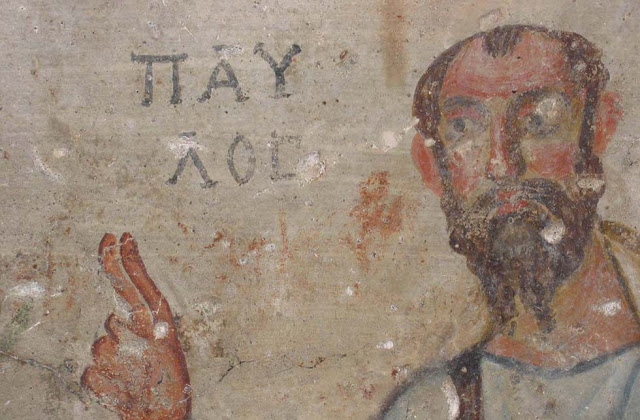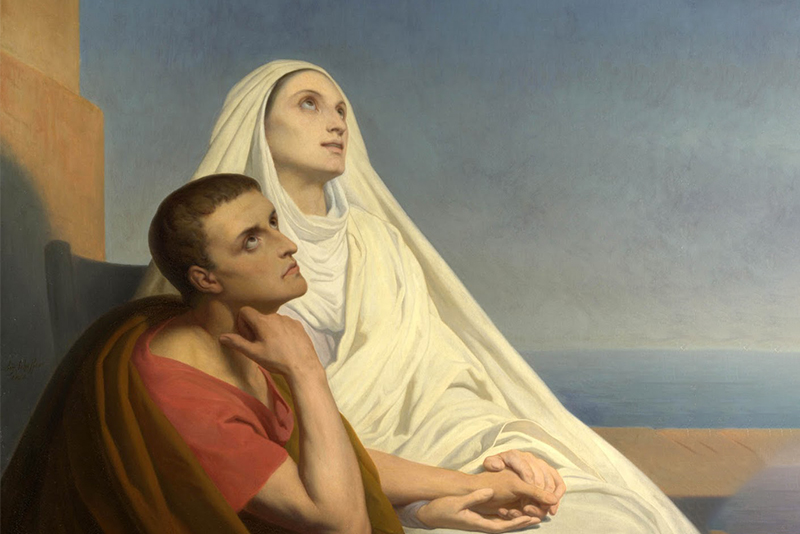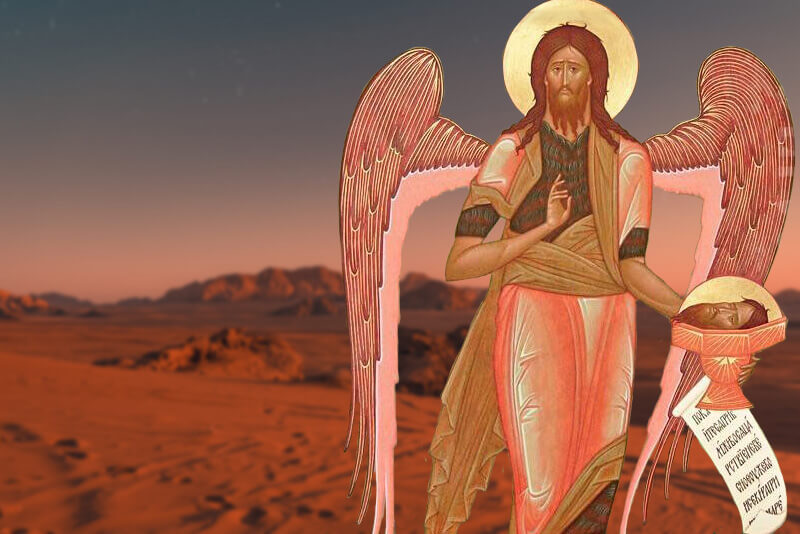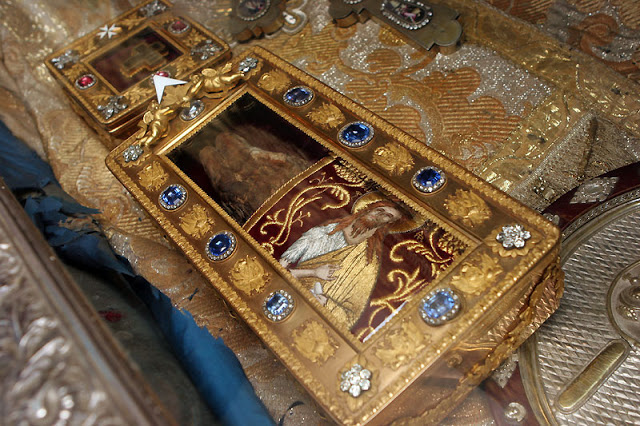“But we preach Christ crucified, to the Jews a stumbling block and to the Greeks foolishness, but to those who are called, both Jews and Greeks, Christ the power of God and the wisdom of God”
(1 Corinthians 1:23-24)
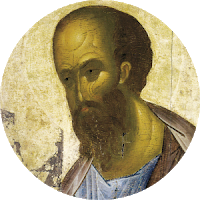
Preaching was the work of Apostle Paul’s whole life. He stated himself, “For Christ did not send me to baptize, but to preach the gospel, not with wisdom of words, lest the cross of Christ should be made of no effect” (1 Corinthians 1:17).
We know from the Book of Acts that right after Apostle Paul’s conversion, he began to preach for the Hebrews in their synagogues that Jesus from Nazareth was the Son of God, the Christ that had been promised to them. Many of them were confused be that statement, while others joined the Church: Apostle Paul knew the Scripture well and could prove that the Messiah had come already, that He had to suffer, be killed and resurrect for our salvation, based on the Law of Moses, the words of the prophets and psalms. Many people were amazed when they heard him: “Is this not he who destroyed those who called on this name in Jerusalem?” (Acts 9:21)
From the Holy Scripture, we know about four missionary journeys of Apostle Paul. Many of his trips lasted for several years and during that time Apostle Paul managed to establish several church communities. For his entire life, the Apostle maintained constant contact with those communities, sending them his letters, in which he explained the issues of Christian teaching and guided them in morality matters.
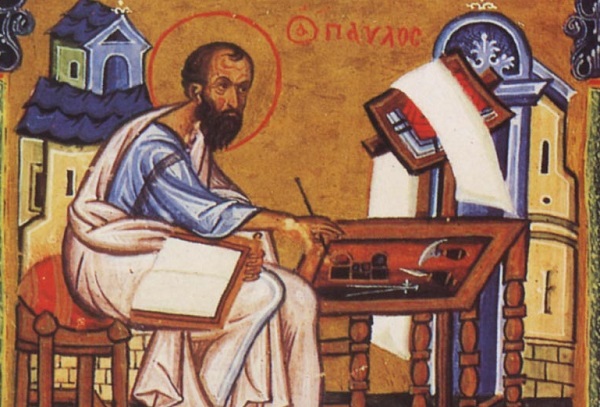 |
| Apostle Paul working on one of his letters |
Apostle Paul desired to turn all the people to Christ so much that he even tried to ensure that there would be no obstacles to conversion of people. That is why he did not want to burden someone and worked with his own hands to earn for living.
There was a certain strategy in the apostle’s preaching. He tried to preach in the largest cities first, such as Thessaloniki, Corinth, Ephesus and others. Those cities were the capitals of the Roman provinces, where large communities of Hebrews lived. And we know that Apostle Paul always began his preaching about Christ for Hebrews first. Then, if they did not accept his word, Paul addressed to pagans, since according to the Gospel teaching, all the peoples are called to enter the Kingdom of Heaven, to become saints and to receive what was promised by God.
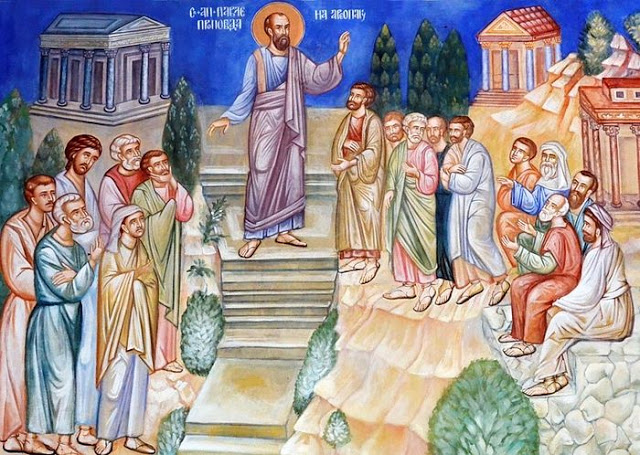 |
| Apostle Paul preaching in Athens |
Athens was one of such cities, where the apostle preached for pagans. The Book of Acts tells us that Apostle Paul was preaching on the city square, when he saw the epicurean and stoic philosophers, who brought him to the well-known Areopagus. The apostle began his preaching rather wisely: he pointed out that he was preaching the same God, which they honored as well and to which they even made an altar with the inscription “To the Unknown God”. Although the Athenian wise men were ready to accept the teaching about the One God, the Last Judgement and the necessity to repent in our evil deeds, they began to scoff at the apostle when they heard about the Resurrection and Paul had to leave them.
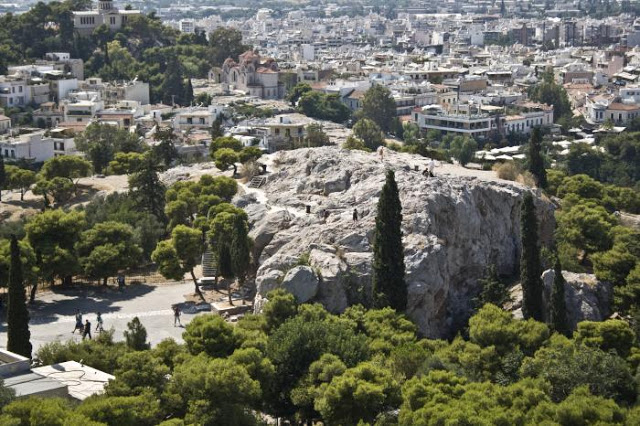 |
| Mount Areophagus |
That was the first time when the Hellene wisdom faced the Gospel Message, the Wisdom of God, which can seem insane to people. We see that the wisdom of people was not ready to accept the Truth. However, there were several people who believed and turned to God through Paul’s word, which meant that his preaching was not useless. But it would took several ages for the Hellene wisdom to accept the Cross of Christ, this “stumbling block to
the Jews”. The seed of the Good News thrown by Apostle Paul Athens, that center of ancient wisdom, would bring much fruit, which would feed many people seeking for the Truth. As for Apostle Paul, he would remain an outperformed theologian and the greatest preacher of the Cross of Christ.
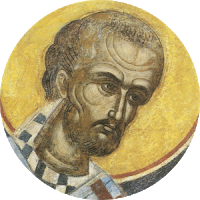
What St. John Chrysostom says in his works:
“Paul was but one man, yet how many did he draw after him? If we were all such as he, how many worlds might we not have drawn to us? Behold, Christians are more numerous than Heathens. And in other arts, one man can teach a hundred boys together; but here, where there are many more teachers, and many more than the learners, no one is brought over. For those who are taught, look to the virtue of their teachers: and when they see us manifesting the same desires, pursuing the same objects, power and honor, how can they admire Christianity? They see our lives open to reproach, our souls worldly. We admire wealth equally with them, and even more. We have the same horror of death, the same dread of poverty, the same impatience of disease, we are equally fond of glory and of rule. We harass ourselves to death from our love of money, and serve the time. How then can they believe? From miracles? But these are no longer wrought. From our conversation? It has become corrupt. From charity? Not a trace of it is anywhere to be seen. Therefore we shall have to give an account not only of our own sins, but of the injury done by them to others. Let us then return to a sound mind; let us watch, and show forth a heavenly conversation upon earth. Let us say, “Our conversation is in heaven”, and let us upon earth maintain the contest”.
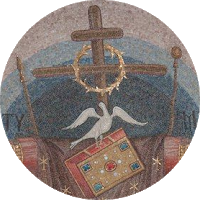
Reflections in the Holy Church tradition:
From Heaven, from Christ God, thou didst receive the call, thus appearing as the preacher of light, illuminating all with the teachings of grace; for having impugned the worship of the written law, thou didst cause to rise the knowledge of the Spirit for believers. Therefore, worthily thou didst ascend to the third heaven and attained paradise. Wherefore, O Apostle Paul, intercede with Christ God to grant forgiveness of iniquities to those who eagerly celebrate thy holy memorial. (2nd Kathisma)
To be continued…
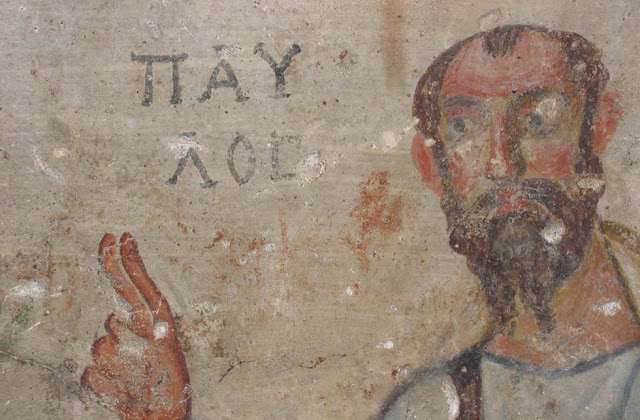
 Preaching was the work of Apostle Paul’s whole life. He stated himself, “For Christ did not send me to baptize, but to preach the gospel, not with wisdom of words, lest the cross of Christ should be made of no effect” (1 Corinthians 1:17).
Preaching was the work of Apostle Paul’s whole life. He stated himself, “For Christ did not send me to baptize, but to preach the gospel, not with wisdom of words, lest the cross of Christ should be made of no effect” (1 Corinthians 1:17).


 What St. John Chrysostom says in his works:
What St. John Chrysostom says in his works: Reflections in the Holy Church tradition:
Reflections in the Holy Church tradition:
